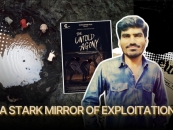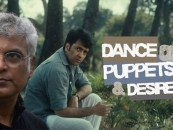
MOVIES: BALANCING ART, RECOGNITION & RESPONSIBILITY
by Utpal Datta March 7 2025, 12:00 am Estimated Reading Time: 4 mins, 0 secsRecognizing directors as the artistic visionaries behind cinema, Utpal Datta advocates for their official acknowledgment in film certification, explores challenges in film education, and examines cinema’s role in shaping India's cultural and social narrative.
The role of film directors in shaping cinema's artistic vision is often overshadowed by producers in official records. This article highlights the need for director credit in film certification, explores challenges in Indian film education, and discusses the impact of cinema on society. With government initiatives supporting Indian cinema growth, the article examines how film schools, awards, and policies influence storytelling. It also addresses concerns over negative portrayals of India in films, urging a balanced approach to artistic freedom and national image.
The producer is undoubtedly the owner of a film, but the director is the one who creates its artistic essence. When people discuss a film, it is almost always the director's name that is mentioned first. This is a widely accepted practice. Movie posters often feature the phrase "A Film By," followed by the director's name. However, in India, the government's film censor certificate only includes the producer's name. Since this certificate is an official document, including the director's name would honour the creator and acknowledge the film's artistry.

The Need for Official Recognition
In the context of published book registration, both the author and the publisher receive credit. A similar practice should be adopted for films by the government authority. I once discussed this idea with Prasoon Joshi, former Chairperson of the Central Board of Film Certification (CBFC), who fully supported my suggestion. However, no action was taken. During a film festival, I also brought this issue to Anurag Thakur, the Minister of Information and Broadcasting at the time. Although he listened attentively, neither he nor his office responded to my subsequent letter. Additionally, my discussions with several filmmakers did not generate much enthusiasm for the idea.
This remains one of the most straightforward yet essential steps the government can take to give due recognition to film creators.
Cinema is a part of society, a form of art, and a business. Recognizing this, the government has undertaken various initiatives to support the growth of the film industry, including formulating policies and providing incentives like tax benefits. Over the years, the central government has helped Indian cinema flourish by organizing international film festivals, promoting Indian films abroad, establishing film education institutions, and awarding prizes for cinematic excellence.
Film Education and Its Challenges
Film production is primarily a technical art form requiring skilled craftsmen with a strong sense of aesthetics. Institutions like the Film and Television Institute of India (FTII) in Pune and Satyajit Ray Film and Television Institute (SRFTI) in Kolkata have produced such talent, significantly strengthening the technical aspects of Indian cinema. However, these institutions have not been equally successful in nurturing directors.
Creating art cannot be taught in a classroom; it emerges from the inner world of the creator. Many renowned filmmakers, including Shyam Benegal and Rima Das, never attended film schools. Those who studied in the direction departments of Indian film schools—such as Adoor Gopalakrishnan and Vidhu Vinod Chopra—are among the few who have achieved notable success. While this does not imply that film schools have underperformed in this area, their impact on direction has not matched their success in technical disciplines.
Given India's rich cultural heritage, the education and development of cinema should have been guided by aesthetics. Institutions like the Lalit Kala Akademi and the Sangeet Natak Akademi have preserved, promoted, and practised culture. Film education should follow similar models.
The Challenge of Unscheduled Languages in Cinema
National film awards and initiatives like the Indian Panorama have made commendable efforts to encourage films in various Indian languages. However, challenges remain, particularly in awarding films on unscheduled languages. While the intention to bring these stories to light is commendable, it is often undermined when filmmakers with little connection or understanding of these communities produce films solely to win awards. Such practices dilute the spirit of these awards and must be curbed.
Moreover, many films showcase regressive aspects of society, such as superstition and social backwardness, which is counterproductive to the government's goal of uplifting marginalized groups. While global interest in India's socio-economic challenges has inspired filmmakers, this focus often tarnishes the country's image. The government must regulate both domestic and foreign films that portray India negatively, in the present and past representation of history, politics and society.
Some may argue that such actions restrict artistic freedom. To them, I pose a question: Is freedom limited to highlighting the negatives of one's own country? While art should remain free, no government should support films that harm the country's image, whether by focusing on past tragedies or present conflicts. This is an issue the government must consider seriously.







-173X130.jpg)
-173X130.jpg)

-173X130.jpg)


-173X130.jpg)
